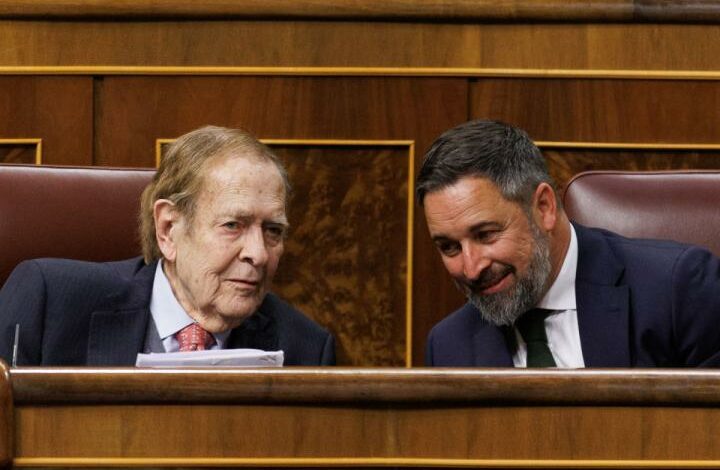Spain’s No-confidence vote: a mirror for the two Spains to see their contradictions

Doomed to failure from the beginning, this no-confidence vote was an opprtunity for the two Spains to expose their contradictions.
Spain has just concluded its two days of a marathon debate on the no-confidence motion presented by right-wing party VOX against the leftist coalition government of Prime Minister Pedro Sanchez after they reformed the law on sedition to ease the legal pressure on Catalan separatists.
The no-confidence was rejected by the Spanish parliament with just the 52 votes of VOX in favour of withdrawing confidence from the incumbent government and 201 votes against it. The Popular Party (PP) abstained from the vote because they did not want to vote “yes” as a matter of “respect for the Spanish people” and did not to say “no” out of respect for Mr. Ramón Tamames, the leader of the vote, Cuca Gamarra, spokeswoman of the party, said.
The debate, which has been going for two days, constitutes an opportunity for the Spanish people to see the contradictions of their mainstream parties as each intervention during the plenary session stands as a discourse analysis of some opponent politician or political party that makes the job of a political commentator easier.
Seeing these contradictions, the people of the polarized two Spains may realize that this polarization is not rooted in real differences as much as it is rooted in political calculations.
The vote was surprinsingly led by the well respected economist and Communist figure Ramón Tamames, 89, in what seems to be a political move by Santiago Abascal, leader of Vox, to lure votes from centre, left, and right in the upcoming elections.
The timing and the choice of Professor Tamames have provoked much criticism against Vox from the left and the right inside and outside of the Spanish parliament.
Alberto Núñez Feijóo, leader of the Popular Party, a right-wing opposition party, who instead of attending the debate was meeting EU ambassadors in the Swiss embassy, criticized VOX for giving the leftist coalition an opportunity to launch their electoral campaign. For him, the vote was unnecessary with elections due in December.
Yet, the abstention of the PP from the vote may not spare them blame for implicit support for the vote in a manner that approximates their conduct in the eyes of the Spanish voters to that of the very provocative VOX. Patxi López, from Sanchez’s Socialist Worekrs’ Party (PSOE), said the abstention of the PP legitimates VOX.
On the second day of the debate, Inés Arrimadas, spokeswoman for the center party Ciudadanos, alleged that Alberto Núñez Feijóo, the leader the Popular Party, is acting as “invisible protagonist” of the no-confidence vote by withdrawing from the debate instead of acting as a real leader of the opposition and bringing the vote himself.
It seems, indeed, that knowing that the no-confidence has no many political gains to offer to those who take part in it, the Popular Party decided to reap the benefits of abstaining from it. In other words, the Popular Party wanted the vote to take place so as they can put on a cloak of moderation not only before the Spanish people but also before the world by rushing to the Swiss embassy in order to imply more commitment to technocracy and Europe than the other parties.
The comments of the ruling coalition figures on the candidacy of Professor Tamames have been faithful to a tradition among Spain’s leftists of cultural reductionism.
Pedro Sanchez, Spain’s prime minister and leader of PSOE, accused Santiago Abascal, leader of VOX, of hiding his agenda behind the figure of Ramón Tamames. “With your candidacy,” he said addressing Tamames, “you are supporting a party that rejects equality between men and women.”
Yolanda Diaz, second deputy PM, reproached Ramón Tamames, former leader of the Spanish Communist Party who explained that his candidacy on behalf of VOX is one of his last expressions of love for Spain, for not alluding to women in his speech. Aina Vidal MP of Podemos accused Santiago Abascal of hiding behind Professor Tamames in order not to come out as defeated for a second time.
Spain’s leftists’ obsession with healing Spain culturally is backfiring against them despite the many progressive gains, under the leadership of Equality Minister Irene Montero, which make Spain today one of the world’s most progressive countries.
It is backfiring due to other more technical setbacks such as Spain’s handling of the Covid 19 crisis and the Algeria-Morocco debacle. Besides, the cultural remedies were sometimes taken too far. Montero’s law “Solo si es si,” which was supposed to face an increasing wave of sex crimes by making consent only verbal and assertive, ended up reducing sentences for rapists due its failure to set a borderline between sexual aggression and sexual harassment.
Spain’s leftists of UNIDAS PODEMOS may have been blinded to this contradiction by their desire to sound as strict as possible to run as far as possible in their cultural campaign.
This is the second no-confidence motion brought by VOX against the government of Sanhez. The first was in 2020 and the pretext was the government’s mishandling of the COVID pandemic.
Mr. Tamames has often justified his political swings since the fall of Franco in 1975 as part of an evolutionary process. His acquiescence to join the No-confidence Vote of VOX might also indicate dissatisfaction with the kind of leftism incarnated by the Spain’s PSOE and Podemos- a dissatisfaction that drives many leftists in Europe towards the new right.
This dissatisfaction is with a leftist discourse that treats patriotism and nationalism, on the one hand, as incompatible and contradictory with socialism and leftism, on the other. The two parties of the ruling coalition in Spain subscribe to a new tradition in the Western left whose universalism drives some leftist voters who want a more local Socialist commitment towards the right.
What turns voters away in this universalism is not the left’s handling of the immigration question nor is it their espousal of cultural Globalization. It is rather these parties’ seeming leniency towards the question of separatism.
The contradictions between and within the two Spains were described by Professor Tamames himself who regretted that “this is not a parliamentary session. It is a rally to prepare for the May 28 elections.”
He also regretted the sharp tone used in the debate which threatens the principles of coexistence, which recalls “the two Spains,” in reference to the Spanish Civil War (1936-1939) where the two sides fought under two different flags.




